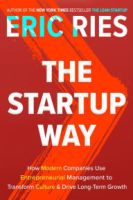 The Startup Way: How Modern Companies Use Entrepreneurial Management to Transform Culture and Drive Long-Term Growth
The Startup Way: How Modern Companies Use Entrepreneurial Management to Transform Culture and Drive Long-Term Growth
Eric Ries
Currency/An imprint of the Crown Publishing Group (October 2017)
How managers in a VUCA world become more adaptive, more humane, more rigorous, and more efficient
The Lean Startup methodology continues to work very well for Eric Ries during his entrepreneurial career thus far as have Warren Buffett’s investment strategies for him. However, many (if not most) of those who aspire to achieve success comparable to theirs must overcome a “knowing-doing gap” and very few do. Thomas Edison nailed it years ago: “Vision without execution is hallucination.” Understanding the “what” and “how” are imperative but insufficient to achieve the level of success that Ries and Buffett have.
I agree with Ries that “the principles of entrepreneurial management could be applied in any industry, size of company, or sector of the economy.” Leaders need to set their organization on a path –and then keep them on a path — “for growth and adaptability, and leave a legacy hat would allows that organization to flourish long term.”
I also agree with him that many organizations today “are missing capabilities that are needed to thrive in the century ahead: the ability to experiment rapidly with new products and new business models, the ability to empower their most creative people, and the ability to engage again and again in an innovative process — to managed it with rigor and accountability — so that they can unlock new sources of growth and productivity.”
Ries wrote this book in order to develop in greater depth several of the key insights shared in his previously published book, The Lean Startup. The information, insights, and counsel he provides in both books can help prepare leaders in almost any organization beyond the “getting started phase.” More specifically:
o He thoroughly explains how traditional management and what he calls entrepreneurial management can work together.
o He recommends what startups need to do beyond Lean Startup — “when they have the problems that come with rapid growth and scale.”
o He suggests “what an organizational transformation process should look like in order to move toward a leader, more iterative way of working.”
It is imperative for change agents to understand that that Lean is a mindset that guides and informs a continuous process. Ries identifies five key principles of the Startup Way philosophy and thoroughly explains each in the book:
1. Continuous Innovation
2. Startup as atomic unit of work
3. The missing function (i.e. entrepreneurship)
4. The second founding (i.e.rewrite the organizational DNA)
Obviously no brief commentary such as mine can do full justice to the scope and depth of material that Eric Ries provides. Equally obvious and more to the point, it would be a fool’s errand to attempt to adopt all of his suggestions and recommendations. Viewed as a process, the Startup Way is not for every organization but leaders who have mastered the Start Up Way as a mindset can be of incalculable value to “any organization in any industry, size of company, or sector of the economy.”